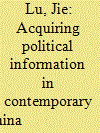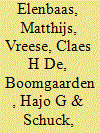|
|
|
Sort Order |
|
|
|
Items / Page
|
|
|
|
|
|
|
| Srl | Item |
| 1 |
ID:
123702


|
|
|
|
|
| Publication |
2013.
|
| Summary/Abstract |
Using complementary information from two national surveys conducted in 2008, i.e. the China Survey and the ABS II Mainland China Survey, this paper presents a comprehensive picture of the media channels that Chinese citizens use for political information, as well as their relative importance as assessed by the Chinese people. Moreover, assisted by multiple regressions, this paper also identifies which groups of Chinese are more likely to use each of these channels for political information. This paper contributes to our understanding on (1) the relative significance of various media channels in contemporary China's political communication; and (2) how Chinese citizens select themselves into specific channels for political information, given their increasing autonomy in acquiring such information from China's changing media.
|
|
|
|
|
|
|
|
|
|
|
|
|
|
|
|
| 2 |
ID:
177188


|
|
|
|
|
| Summary/Abstract |
Widespread distrust in politicians is often attributed to the way elites portray politics to citizens: the media, competing candidates, and foreign governments are largely considered responsible for portraying politicians as self-interested actors pursuing personal electoral and economic interests. This article turns to the mass level and considers the active role of citizens in disseminating such information. We build on psychological research on human cooperation, holding that people exhibit an interpersonal transmission bias in favor of information on the self-interested, antisocial behavior of others to maintain group cooperation. We posit that this transmission bias extends to politics, causing citizens to disproportionally disseminate information on self-interested politicians through interpersonal communication and, in turn, contributes to distrust in politicians and policy disapproval. We support these predictions using novel experimental studies, allowing us to observe transmission rates and opinion effects in actual communication chains. The findings have implications for understanding and accommodating political distrust.
|
|
|
|
|
|
|
|
|
|
|
|
|
|
|
|
| 3 |
ID:
118529


|
|
|
|
|
| Publication |
2012.
|
| Summary/Abstract |
Public evaluations of EU performance are not only critical indicators of the EU's output legitimacy, but also shape future support for European integration. For citizens to monitor the political performance of the EU they need relevant facts, yet it is anything but clear that gains in information about EU performance cause change in judgements about such performance. Drawing on two-wave panel data, this article examines whether acquiring information following a real-world EU decision-making event alters citizens' judgements about the utilitarian and democratic performance of the EU. It also examines how this effect differs for people with different levels of general political information. It is found that citizens who acquired performance-relevant information became more approving of the EU's utilitarian performance but did not change their judgements about its democratic performance. Also, individuals with moderate levels of general political information were affected most strongly by new facts about performance. The implications of these findings for EU-level representative democracy are considered.
|
|
|
|
|
|
|
|
|
|
|
|
|
|
|
|
| 4 |
ID:
090237


|
|
|
|
|
| Publication |
2009.
|
| Summary/Abstract |
Just as radio and television revolutionized the presidential election process in earlier decades, today the "new media" are making a significant imprint on how campaigns are conducted by candidates, covered by journalists, and evaluated by the voters. While the same basic goals for campaigns apply, the tools to accomplish these goals have expanded.
|
|
|
|
|
|
|
|
|
|
|
|
|
|
|
|
| 5 |
ID:
141153


|
|
|
|
|
| Summary/Abstract |
Conventional wisdom holds that Pakistanis are overwhelmingly opposed to American drone strikes in their country’s tribal areas and that this opposition is driven by mass media coverage of the loss of life and property the strikes purportedly cause. Using an approach based in the literature in political communication and public opinion, we argue this conventional wisdom is largely inaccurate. Instead, we contend that awareness of drone strikes will be limited because Pakistan is a poor country with low educational attainment, high rates of illiteracy and persistent infrastructure problems that limit access to mass media. Moreover, because of these same country characteristics, Pakistanis’ beliefs about drone strikes will be shaped primarily by informal, face-to-face political communication, rather than through more formal media sources. We test this argument using data that we collected by fielding a 7,656 respondent, nationally-representative survey carried out in Pakistan in 2013. The results of the statistical analysis support our arguments.
|
|
|
|
|
|
|
|
|
|
|
|
|
|
|
|
| 6 |
ID:
112373


|
|
|
|
|
| Publication |
2012.
|
| Summary/Abstract |
This study examines the effect of political information levels and intervention stages on the formation and continuity of public support for military interventions by analyzing survey data pertaining to the 2003 military intervention in Iraq. The results show that before and immediately after the launch of the intervention, politically uninformed individuals expressed higher support for the war compared to politically informed ones. However, as the intervention proceeded and casualties were incurred, higher rates of decrease in support were observed among the politically uninformed. Politically informed individuals, on the other hand, demonstrated more stable levels of support throughout the course of the intervention.
|
|
|
|
|
|
|
|
|
|
|
|
|
|
|
|
|
|
|
|
|